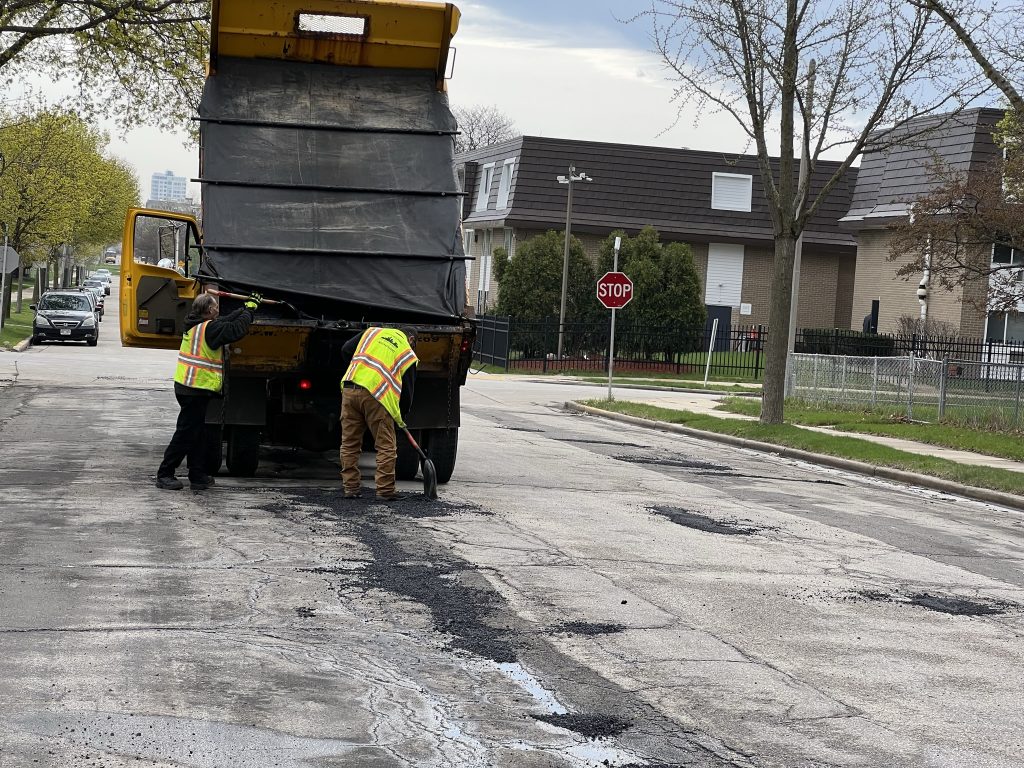Want That Road Get Repaved? Have More Babies
Under Trump, DOT wants more road funding for areas with higher birth, marriage rates.

A Department of Public Works crew fills potholes by W. Juneau Ave. and N. 20th St. Photo by Jeramey Jannene.
When Vice President JD Vance said, “I want more babies in the United States of America” on Jan. 24, you would be forgiven if you thought it had nothing to do with potholes.
But under President Donald Trump‘s administration, having more babies, and who you’re having them with, could now determine transportation funding in your community.
A memo signed by U.S. Department of Transportation Secretary Sean Duffy instructs the department to proritize funding to communities with higher than average birth and marriage rates.
“To the maximum extent permitted by law, DOT-supported or -assisted programs and activities, including without limitation, all DOT grants, loans, contracts, and DOT-supported or -assisted State contracts, shall prioritize projects and goals that… mitigate the unique impacts of DOT programs, policies, and activities on families and family-specific difficulties, such as the accessibility of transportation to families with young children, and give preference to communities with marriage and birth rates higher than the national average,” says the undated memo.
Duffy, a former Wisconsin congressman who now lives in New Jersey, has nine children with his wife, Rachel Campos-Duffy.
It’s not immediately clear how such direction would impact funding allocations, which include everything from formula funds awarded to states for road construction to discretionary grant programs to build bridges and transit systems.
It would appear to prioritize suburban and rural funding.
A 2018 Pew Research Center report that 44% of people in urban areas were married, compared to 50% in suburban areas or 51% in rural areas. A 2018 National Center for Health Statistics report found that large metro counties had a total fertility rate of 1,712 per 1,000 women compared to 1,778 in small or medium counties and 1,950 in rural counties.
Wisconsin had the 23rd highest total number of births in 2023, according to a National Center for Health Statistics report. And while that would bolster Wisconsin’s case, it wouldn’t be good for its largest city. According to a 2024 Marquette University Law School report, Milwaukee’s birth and marriage rates are falling faster than the national average.
If you think stories like this are important, become a member of Urban Milwaukee and help support real, independent journalism. Plus you get some cool added benefits.
Transportation
-
Congestion Pricing Cuts Air Pollution in New York City
 Dec 14th, 2025 by Jeff Wood
Dec 14th, 2025 by Jeff Wood
-
FTA Tells Milwaukee to Crack Down on Fare Evasion — Even Where Fares Don’t Exist
 Dec 12th, 2025 by Graham Kilmer
Dec 12th, 2025 by Graham Kilmer
-
Will GOGO’s Bus Service Ever Get Going?
 Dec 9th, 2025 by Jeramey Jannene
Dec 9th, 2025 by Jeramey Jannene






















Lots of roads for Utah.
Sean should have watched more TV at night.